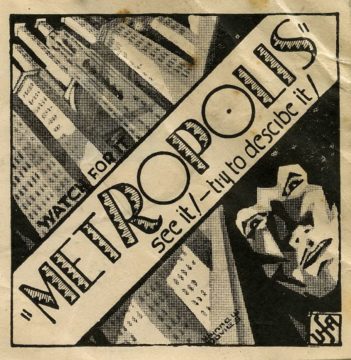Luke Parker in the Los Angeles Review of Books:
 Nabokov loved film, hopelessly. As a young writer in Weimar exile, this Russian aristocrat and Cambridge graduate rented Berlin apartments amidst the city’s countless movie theaters and neon signs, becoming a regular moviegoer. He was less a connoisseur than an avid consumer. Nabokov’s absorption of this mass of films — mostly forgettable, many lost — made him an authority on cinema in the aggregate. It is to these genre films, these sequels and knockoffs, that Nabokov responds in his poem “The Cinema” (“Kinematograf”), and not to the film art and auteur cinema of retrospective accounts. The setting here is not a grandiose premiere in a movie palace. Instead, we are in a corner theater watching a run-of-the-mill American or German release, another product of the Weimar and Hollywood film factories which together accounted for nearly all the films seen by the young émigré in Berlin. Seated among German salesclerks, Nabokov is both charmed and amused. As by all accounts he was in real life: a contemporary recalled the 20-something Nabokov laughing so hard at American slapstick that, choking and shaking with mirth, he had to leave the screening.
Nabokov loved film, hopelessly. As a young writer in Weimar exile, this Russian aristocrat and Cambridge graduate rented Berlin apartments amidst the city’s countless movie theaters and neon signs, becoming a regular moviegoer. He was less a connoisseur than an avid consumer. Nabokov’s absorption of this mass of films — mostly forgettable, many lost — made him an authority on cinema in the aggregate. It is to these genre films, these sequels and knockoffs, that Nabokov responds in his poem “The Cinema” (“Kinematograf”), and not to the film art and auteur cinema of retrospective accounts. The setting here is not a grandiose premiere in a movie palace. Instead, we are in a corner theater watching a run-of-the-mill American or German release, another product of the Weimar and Hollywood film factories which together accounted for nearly all the films seen by the young émigré in Berlin. Seated among German salesclerks, Nabokov is both charmed and amused. As by all accounts he was in real life: a contemporary recalled the 20-something Nabokov laughing so hard at American slapstick that, choking and shaking with mirth, he had to leave the screening.
“The Cinema,” a piece of light verse which touches upon deeper themes — the relation of inanimate to animate, the place of literature in a media age, the future of Russians among Americanized Europeans — was first published in the Russian Berlin newspaper The Rudder (Rul’) in late 1928.
More here.
